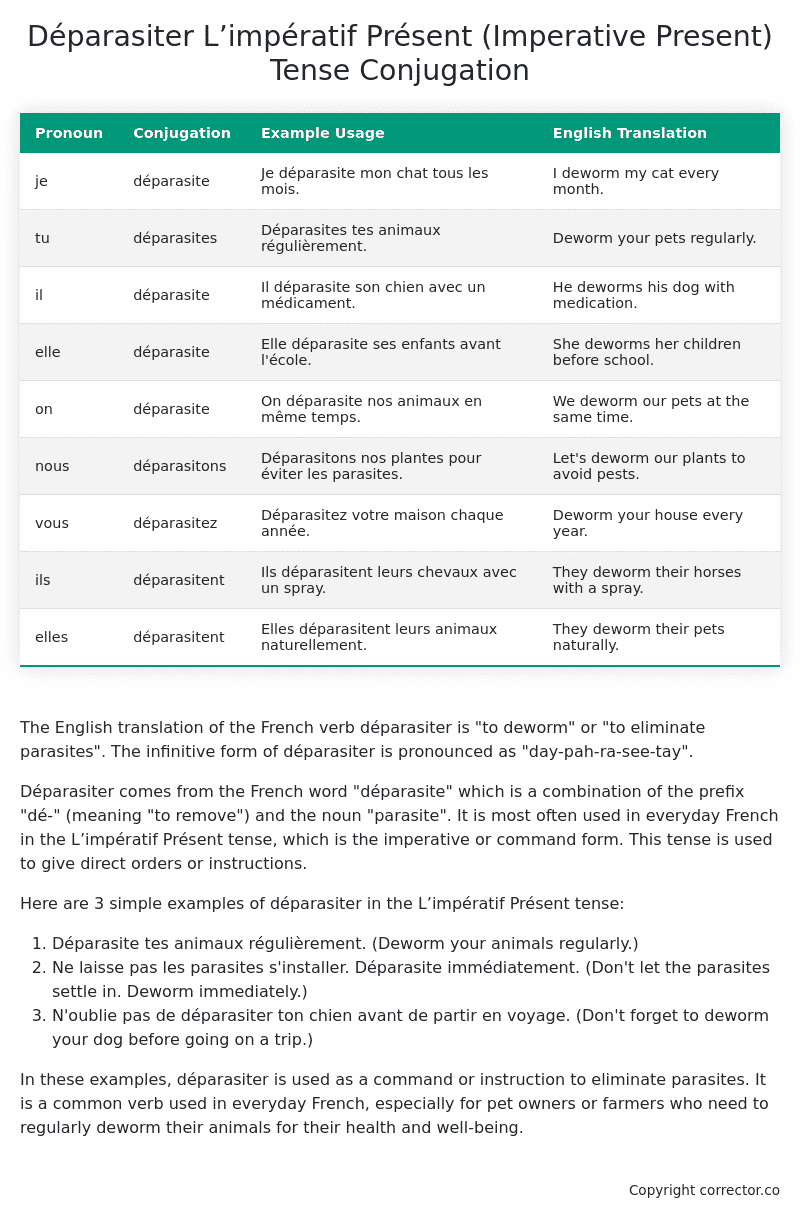L’impératif Présent (Imperative Present) Tense Conjugation of the French Verb déparasiter
Introduction to the verb déparasiter
The English translation of the French verb déparasiter is “to deworm” or “to eliminate parasites”. The infinitive form of déparasiter is pronounced as “day-pah-ra-see-tay”.
Déparasiter comes from the French word “déparasite” which is a combination of the prefix “dé-” (meaning “to remove”) and the noun “parasite”. It is most often used in everyday French in the L’impératif Présent tense, which is the imperative or command form. This tense is used to give direct orders or instructions.
Here are 3 simple examples of déparasiter in the L’impératif Présent tense:
- Déparasite tes animaux régulièrement. (Deworm your animals regularly.)
- Ne laisse pas les parasites s’installer. Déparasite immédiatement. (Don’t let the parasites settle in. Deworm immediately.)
- N’oublie pas de déparasiter ton chien avant de partir en voyage. (Don’t forget to deworm your dog before going on a trip.)
In these examples, déparasiter is used as a command or instruction to eliminate parasites. It is a common verb used in everyday French, especially for pet owners or farmers who need to regularly deworm their animals for their health and well-being.
Table of the L’impératif Présent (Imperative Present) Tense Conjugation of déparasiter
| Pronoun | Conjugation | Example Usage | English Translation |
|---|---|---|---|
| je | déparasite | Je déparasite mon chat tous les mois. | I deworm my cat every month. |
| tu | déparasites | Déparasites tes animaux régulièrement. | Deworm your pets regularly. |
| il | déparasite | Il déparasite son chien avec un médicament. | He deworms his dog with medication. |
| elle | déparasite | Elle déparasite ses enfants avant l’école. | She deworms her children before school. |
| on | déparasite | On déparasite nos animaux en même temps. | We deworm our pets at the same time. |
| nous | déparasitons | Déparasitons nos plantes pour éviter les parasites. | Let’s deworm our plants to avoid pests. |
| vous | déparasitez | Déparasitez votre maison chaque année. | Deworm your house every year. |
| ils | déparasitent | Ils déparasitent leurs chevaux avec un spray. | They deworm their horses with a spray. |
| elles | déparasitent | Elles déparasitent leurs animaux naturellement. | They deworm their pets naturally. |
Other Conjugations for Déparasiter.
Le Present (Present Tense) Conjugation of the French Verb déparasiter
Imparfait (Imperfect) Tense Conjugation of the French Verb déparasiter
Passé Simple (Simple Past) Tense Conjugation of the French Verb déparasiter
Passé Composé (Present Perfect) Tense Conjugation of the French Verb déparasiter
Futur Simple (Simple Future) Tense Conjugation of the French Verb déparasiter
Futur Proche (Near Future) Tense Conjugation of the French Verb déparasiter
Plus-que-parfait (Pluperfect) Tense Conjugation of the French Verb déparasiter
Passé Antérieur (Past Anterior) Tense Conjugation of the French Verb déparasiter
Futur Antérieur (Future Anterior) Tense Conjugation of the French Verb déparasiter
Subjonctif Présent (Subjunctive Present) Tense Conjugation of the French Verb déparasiter
Subjonctif Passé (Subjunctive Past) Tense Conjugation of the French Verb déparasiter
Subjonctif Imparfait (Subjunctive Imperfect) Tense Conjugation of the French Verb déparasiter
Conditionnel Présent (Conditional Present) Tense Conjugation of the French Verb déparasiter
Conditionnel Passé (Conditional Past) Tense Conjugation of the French Verb déparasiter
L’impératif Présent (Imperative Present) Tense Conjugation of the French Verb déparasiter (this article)
L’infinitif Présent (Infinitive Present) Tense Conjugation of the French Verb déparasiter
Struggling with French verbs or the language in general? Why not use our free French Grammar Checker – no registration required!
Get a FREE Download Study Sheet of this Conjugation 🔥
Simply right click the image below, click “save image” and get your free reference for the déparasiter L’impératif Présent tense conjugation!

Déparasiter – About the French L’impératif Présent (Imperative Present) Tense
Usage
Giving commands
Making requests
Offering advice
Expressing desires
Conjugation Formation
Interactions with other tenses
Want More?
I hope you enjoyed this article on the verb déparasiter. Still in a learning mood? Check out another TOTALLY random French verb conjugation!


